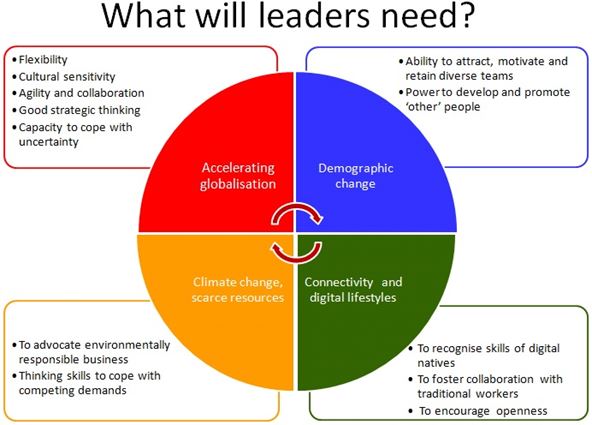Trends in global leadership: where does type fit in?
John Hackston - Head of R&D at OPP

This world of ours is changing. That’s hardly an earth-shattering statement. What’s less obvious is that change is happening more and more quickly – it’s difficult to visualise what the world will be like in five years time, still less in 10, 20 or 30 years. And yet this is what organisations need to do. Today’s new entrants, graduates and management trainees will be tomorrow’s leaders, and we need to prepare them for the challenges ahead.
One way of looking into the future would be to use a crystal ball. A better method might be to build on what we know, by asking ourselves these three questions:- What are the global trends that are already affecting organisations, and how are these going to affect the future?
- Given these trends, what capabilities or skills will leaders need to develop in order to meet the coming challenges?
- How can we help leaders to build these attributes? As type practitioners, how can we use the MBTI® framework?
Four trends in particular are going to be important for organisations:
- Globalisation has moved into a new phase. Previously, multinationals were able to grow by reaching new markets and exploiting overseas labour forces. Much of this was driven by Western organisations. Now, with the help of improved communications, transport and IT, major organisations and influential individuals can be based anywhere. We can expect the shift in power from west to east to continue, the middle classes to grow larger around the world, and to see more diverse teams, with less loyalty to the distant parent organisation. And with everything and everywhere more interconnected, there is likely to be more economic volatility.
- The demographics of the world are changing. Populations everywhere are aging, but this is happening at different rates in different countries, leading to skill shortages in some countries and migrations from others.
- Climate change and scarce resources are major issues. If global emissions dropped tomorrow (which seems highly unlikely), temperatures and sea levels would still continue to rise for some time. Levels of residential and industrial waste are rising, and natural resources, including basic requirements like water, are becoming more scarce.
- The digital revolution is showing no sign of slowing down. The amount of computing power available continues to grow exponentially. Think about all the things you use technology for now that you didn’t ten years ago. Now cast your mind back to 20 years ago and consider how much more rapid recent change is. Project that trend into the future and you can see that technology is going to change more and more quickly.
Clearly, organisations and their leaders face many challenges as we move forward. To meet these challenges leaders will have to embrace change, or at least adapt to it. They will need to be flexible and collaborative, and to have high levels of intellectual and cognitive skill. They will need to understand people from different backgrounds and cultures in order to develop and promote them, and help them work together. They will need to be emotionally intelligent and culturally sensitive.
Leaders who have a high level of self-knowledge, and a framework for understanding others, will have a head start in meeting these challenges. This is an area where tools like the MBTI assessment can really help. Of course, this tool can’t do everything. It can’t, for example, assess or give future leaders the intellectual or cognitive skills required. But it is a big step in the right direction for developing the authentic, emotionally intelligent leaders that organisations need, and comes with a wealth of resources to help leaders deal with the challenges ahead.
Our webcast Trends in global leadership – where does type fit in? addresses these questions in detail. You can view it via our webcasts page here.